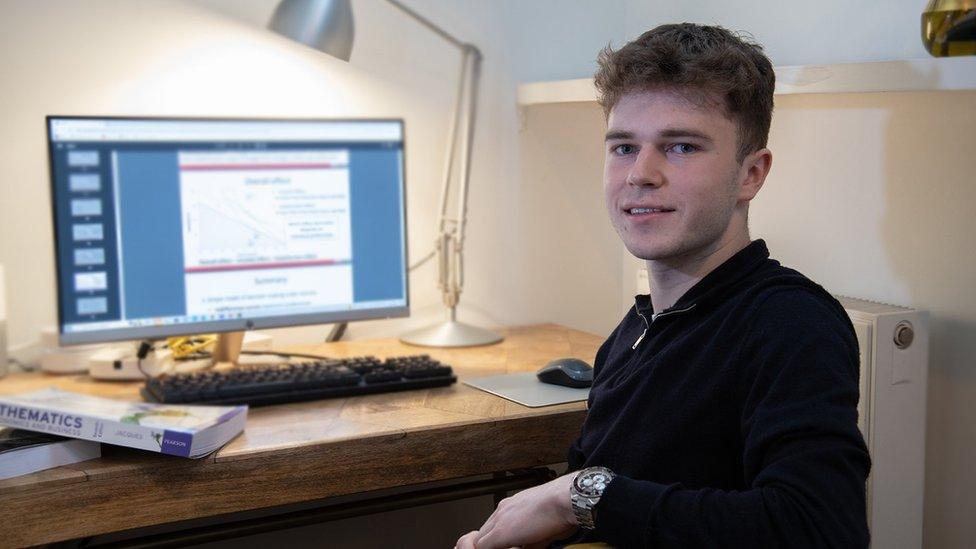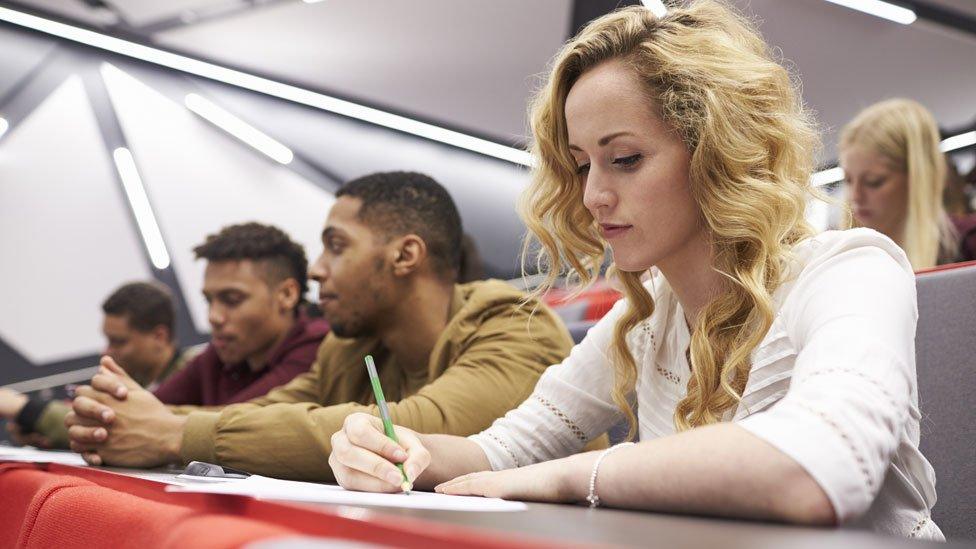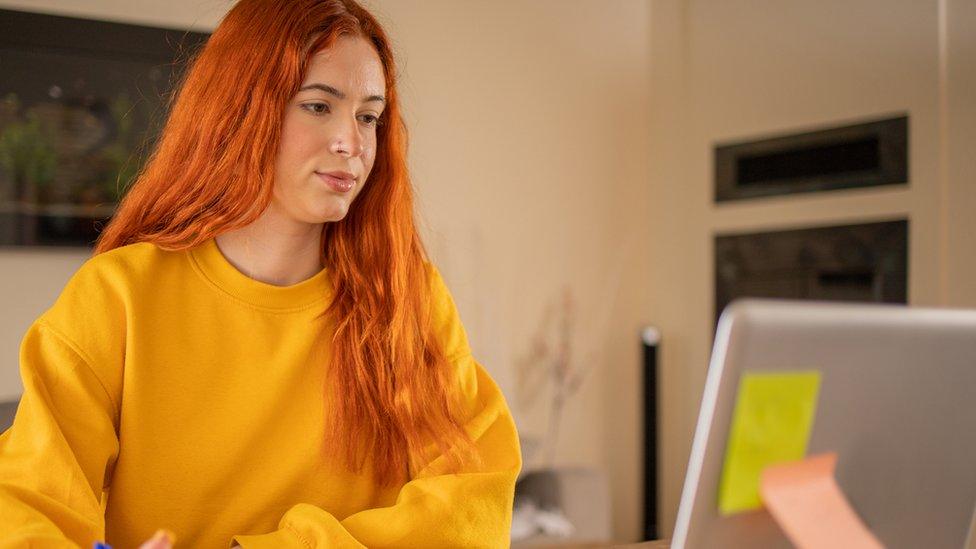Nearly a third of university courses still have hybrid teaching
- Published

Freddie Tyzack says a third of his university teaching time is done online
Almost a third of university courses are still combining face-to-face teaching with online learning in 2022-23, data gathered by the BBC suggests.
Data from 50 of the 160 universities surveyed shows 28% of courses are being taught in a hybrid way, compared with 4.1% in 2018-19 before the pandemic.
One student said he feels like he is paying thousands of pounds per year for a "glorified streaming service".
But an official says many students appreciate the flexibility and freedom.
'It's like watching YouTube'
First-year economics student Freddie Tyzack said he did not realise any of his teaching would be online before he started at the University of Bath in September.
But the 18-year-old says one-third of his contact hours are now taught remotely.
"It's not good value for money at all. It's just like watching a YouTube video," he told the BBC.
"When it's online, you're in your room and you're on your own, you can just sit in bed and watch and then think, 'that's that done - I can go back to sleep'.
"It doesn't get you in a good routine, a good rhythm or a good learning mindset."
He said his course had been oversubscribed, claiming his cohort had been told they could not all fit into one lecture theatre.
In one instance, even a Zoom lecture was capped at 300 attendees - meaning dozens could not watch it live and had to replay it later.
In a statement, a spokesman for the university said almost all teaching took place in-person in the first term of this year, but lectures could also be held online.
He said the blended approach was more inclusive and benefited students in their education.
"If any student has concerns about their course, then we encourage them in the first instance to speak to their director of studies or personal tutor," he said, adding that about 90% of the entire economics course is taught in person.
The university did not respond to Freddie's claim that his course had not been advertised as hybrid before he started.
Six times more hybrid courses
According to the data provided to the BBC, more than 3,500 of the 12,569 courses at the 50 universities which responded are being taught in a hybrid format this year.
Claims that courses have not been advertised as hybrid suggests the true number of blended courses being taught at UK universities this year could be even higher.
Prof David Latchman, vice-chancellor at Birkbeck, University of London, told the BBC that hybrid learning had been part of the long-term plan for many universities even before Covid.
But the pandemic accelerated its introduction, because all students were forced to work from home.
Now he says universities should maintain their levels of online teaching, but keep educational outcomes and student satisfaction under constant review.
"Maybe I'm just old-fashioned, but I still think that face to face is a better learning experience," he said.
"But I think the way that it [blended learning] can help people to keep up and keep going is tremendously important.
"Everything should be quality audited. If you stand in front of a class, the quality audit looks at that. If you're broadcasting, it shouldn't be second best. It should be helping the students with their learning experience. I think that's the one key thing."
A spokesperson for Universities UK, which represents 140 universities, said many students supported hybrid learning as a way of making higher education more accessible, as well as helping them to develop digital skills.
Student union representatives who spoke to the BBC said students have mixed opinions on the new teaching methods.

Lila Tamea worked on a report looking into blended learning for the Office for Students
Lila Tamea, former president at Liverpool John Moores University Students' Union, sits on the student panel at the Office for Students, which recently commissioned a report looking into the quality of blended learning.
She said many students appreciated the flexibility of blended learning, but that it was important for universities to provide as much information as possible about how much teaching will be online before students apply.
"It's really hard for universities to get it right but they're trying to," she said.
"It's important that they continue to listen to and communicate clearly with students on how course learning is delivered."
Aasiyah Patankar, who represents students at Queen Margaret University in Edinburgh, agreed that communication between universities and students is key.
"We've done lots of surveys and things and the majority are really chuffed with how we've managed to bring back in-person teaching bit by bit," she said.
"But you're never going to be able to completely please everyone."


Are you a student whose course is being taught in a hybrid way? Please email us with your views at: haveyoursay@bbc.co.uk, external.
Please include a contact number if you are willing to speak to a BBC journalist. You can also get in touch in the following ways:
WhatsApp: +44 7756 165803, external
Tweet: @BBC_HaveYourSay, external
Or fill out the form below
Please read our terms & conditions and privacy policy
If you are reading this page and can't see the form you will need to visit the mobile version of the BBC website to submit your question or comment or you can email us at HaveYourSay@bbc.co.uk, external. Please include your name, age and location with any submission.

Related topics
- Published9 December 2020

- Published18 September 2021

